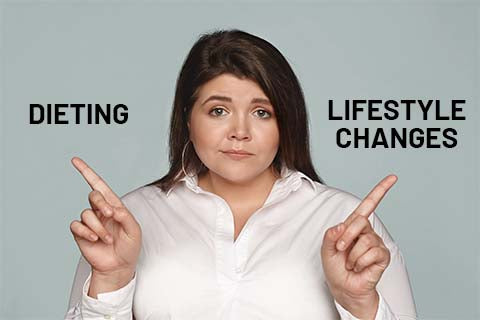October 19, 2023
Madhura Mohan
Dieting Vs Lifestyle Changes For Weight Loss
P
eople starting weight-loss journeys are a frequent occurrence in the fast-paced world of today. There are many opportunities and resources for weight loss, but there are also challenges, like false information, unattainable expectations, and the potential for unhealthy or unsustainable practices.
Here we have three questions for you before we get into the specifics of diet and lifestyle changes:
-
Does weight loss mean slimming down or maintaining a healthy weight?
-
Does weight loss mean cutting down calories?
-
Should maintaining a healthy diet mean a long-term habit or a temporary strategy?
While you contemplate, here’s what we have got to say, weight loss doesn’t simply mean slimming down, isn’t just about cutting down calories, healthy eating should be a habit. A more thorough strategy that considers a number of factors is required to reach a healthy weight.
In this blog, we will examine the main variations between these two methods of weight loss, "dieting" and "lifestyle changes."
WHAT IS DIETING?

Dieting is a short-term, calorie-restrictive method of eating. This strategy involves a short-term quick fix to lose weight quickly. Most traditional diets often reduce the number of calories, reduce/eliminate certain food groups and often deprive the body of certain nutrients detrimental to one’s health. Most traditional diets are defined by a handful of key characteristics: weight is generally lost quickly in a set period of time, foods are categorized as good or bad, eating habits are often based on environmental cues, calorie consumption is greatly restricted, progress is dependent on a number on the scale.
Dieting lowers calorie intake either by limiting portion sizes or choosing low-calorie foods.
LIFESTYLE CHANGES

If diets focus mainly on food intake, lifestyle changes incorporate what you eat along with other factors for the sake of long-term weight control. Lifestyle changes, are long-term adjustments to one’s daily habits and behaviours, encompassing not only diet but also exercise, sleep, stress management, and overall well-being.
WHAT’S THE CONCLUSION? DIETING IS BETTER FOR WEIGHT LOSS OR LIFESTYLE CHANGES?

-
Diet is systemized, temporary or usually aggressive food intake change.
-
Lifestyle change is an attempt to keep up that practice for an extended period of time.
-
Making temporary changes sends you back into the spiral of dieting and weight regain.
-
Dieting is not about eating less food. It’s about choosing nutrient-dense foods and reducing portion sizes. Dieting is not just about the quantity of calories but the quality of calories matter.
-
Dieting is also a lifestyle change, but it’s temporary. Dieting is not a wrong practice but it is meant for short-term periods and generally considers reducing numbers on the scale ignoring the overall health.
-
A change in lifestyle is focused on the big picture of life.
-
If you enjoy a late-night snack, a diet may have you completely cut out that food while a lifestyle change would be figuring out the best way to fuel your body. That might not mean cutting out that food, but maybe not eating it right before bed, and eating less of it. Lifestyle change would entail determining the optimal approach to fuel your body rather than completely eliminating your late-night snacking habit.
HOW TO CHANGE LIFESTYLE?

AVOID EMOTIONAL EATING – Instead of eating only when you are physically hungry, if you eat to deal with or soothe emotional distress like anxiety, sadness, boredom, or stress, that behaviour can lead to overeating or unhealthy food choices, which can result in a higher daily calorie intake.
AVOID RESTRICTED EATING – Crash diets, intermittent fasting, skipping breakfast, calorie-restricted diets, or completely removing certain food groups from your diet will deprive you of vital nutrients and may result in nutritional deficiencies. It's crucial to concentrate on a diet that is sustainable because the secret to healthy eating is balancing your nutritional needs. Regular eating can stabilize blood sugar levels and lower the likelihood of later-day overeating.
REGULAR EXERCISE - Your body burns more calories for energy when you exercise regularly. Strength training on a regular basis can help you gain lean muscle mass, which boosts metabolism and helps you burn more fat at rest. Running, swimming, and cycling are examples of cardio exercises that increase energy expenditure and help create a calorie deficit.
CONSUME BALANCED DIET – A balanced diet helps you create the caloric deficit required for weight loss while also supplying the nutrients your body requires. Lean protein, healthy fats, fruits, vegetables, whole grains, and complex carbohydrates are all components of a balanced diet. A balanced diet includes low-glycemic-index foods, which support a healthy metabolism, can control appetite, and lower overeating. Pick whole, unprocessed foods, limit added sugars, include lean proteins, and place a focus on vegetables and fruits for their increased fibre and nutritional value.
STAY MOTIVATED – An ongoing, long-term effort is needed to lose weight. Maintaining your motivation keeps you committed to making healthier decisions and supports maintaining a regular diet and exercise routine.
Making wise decisions is essential along the way as reaching a healthy weight is a journey rather than a destination…
What you will be eating or not eating is not the real problem; rather, it is how you will still be acting in a year…










Leave a comment